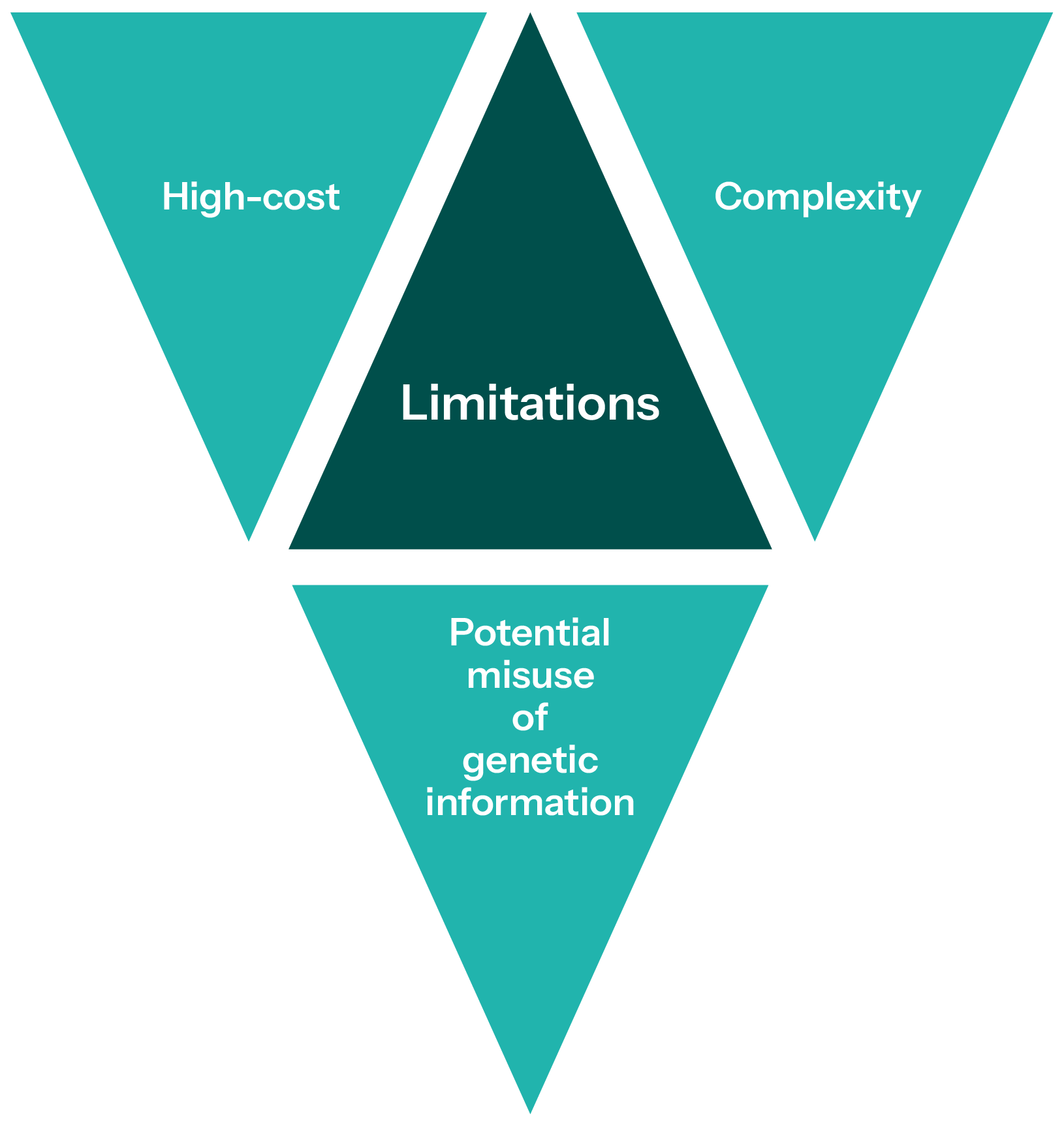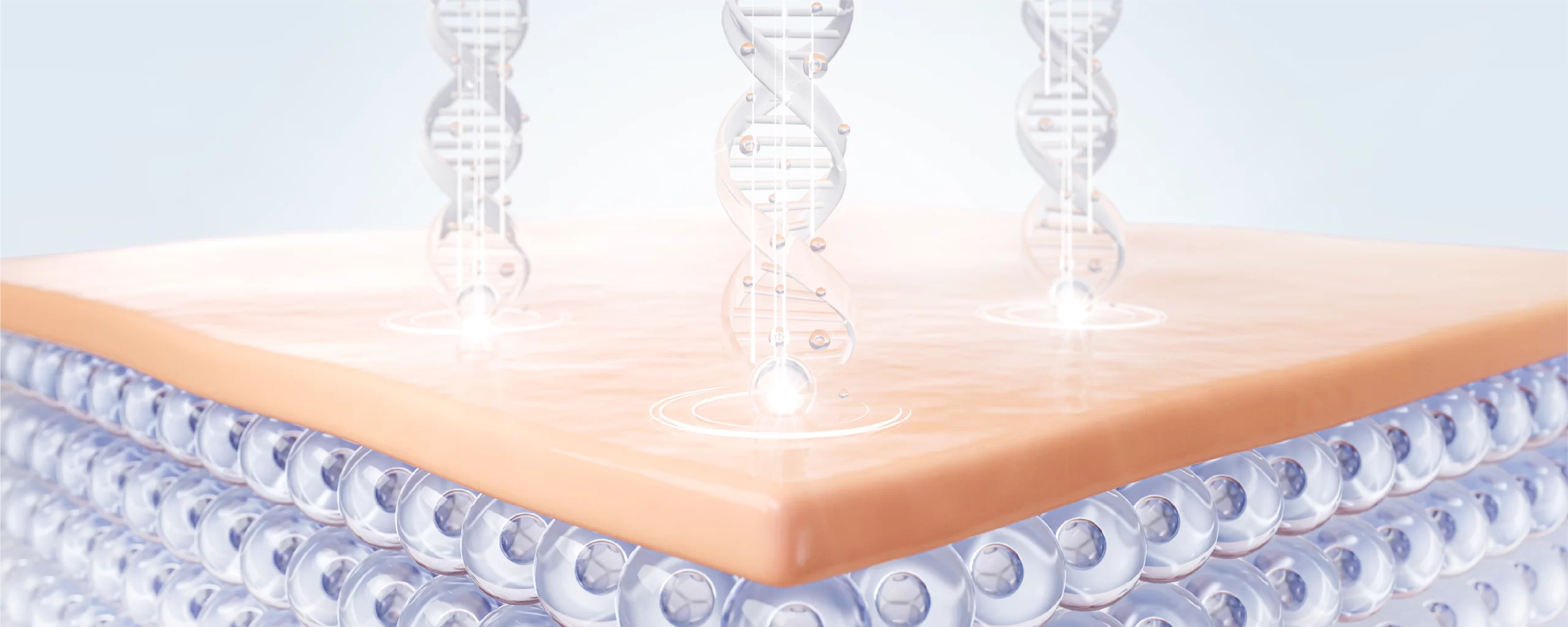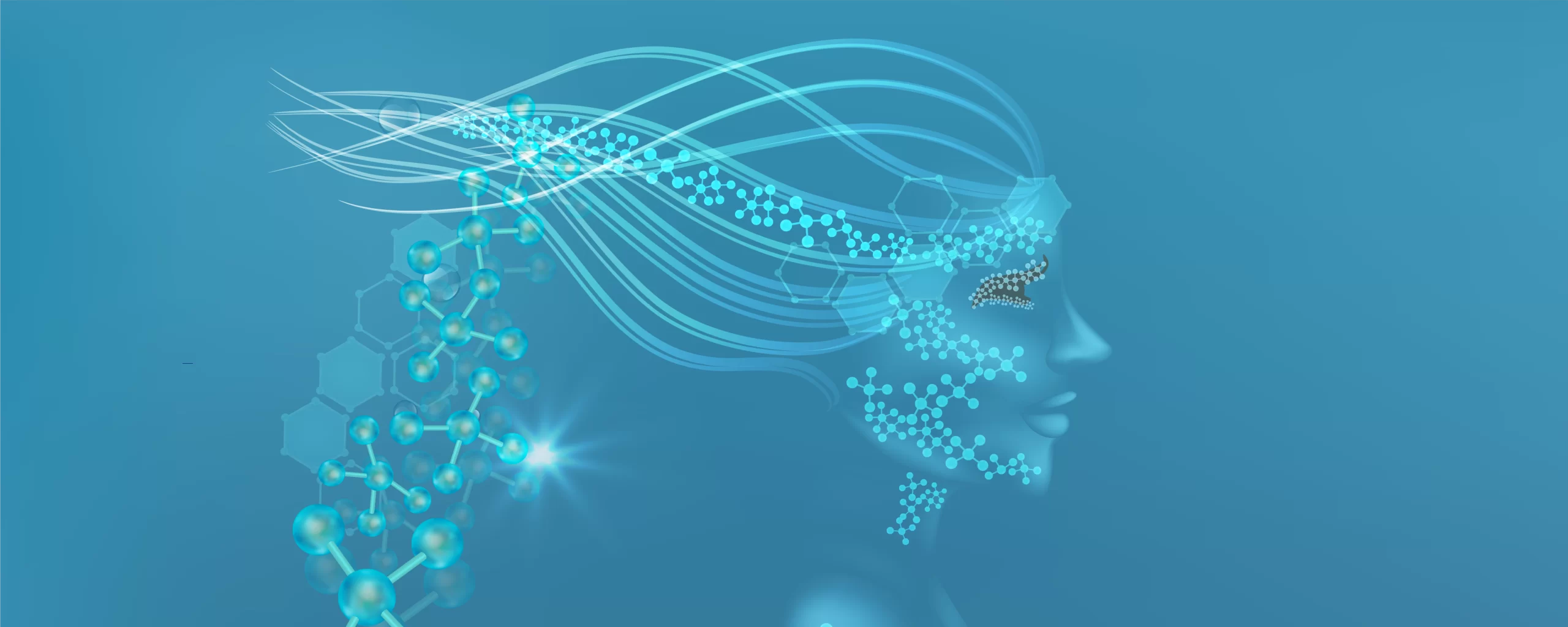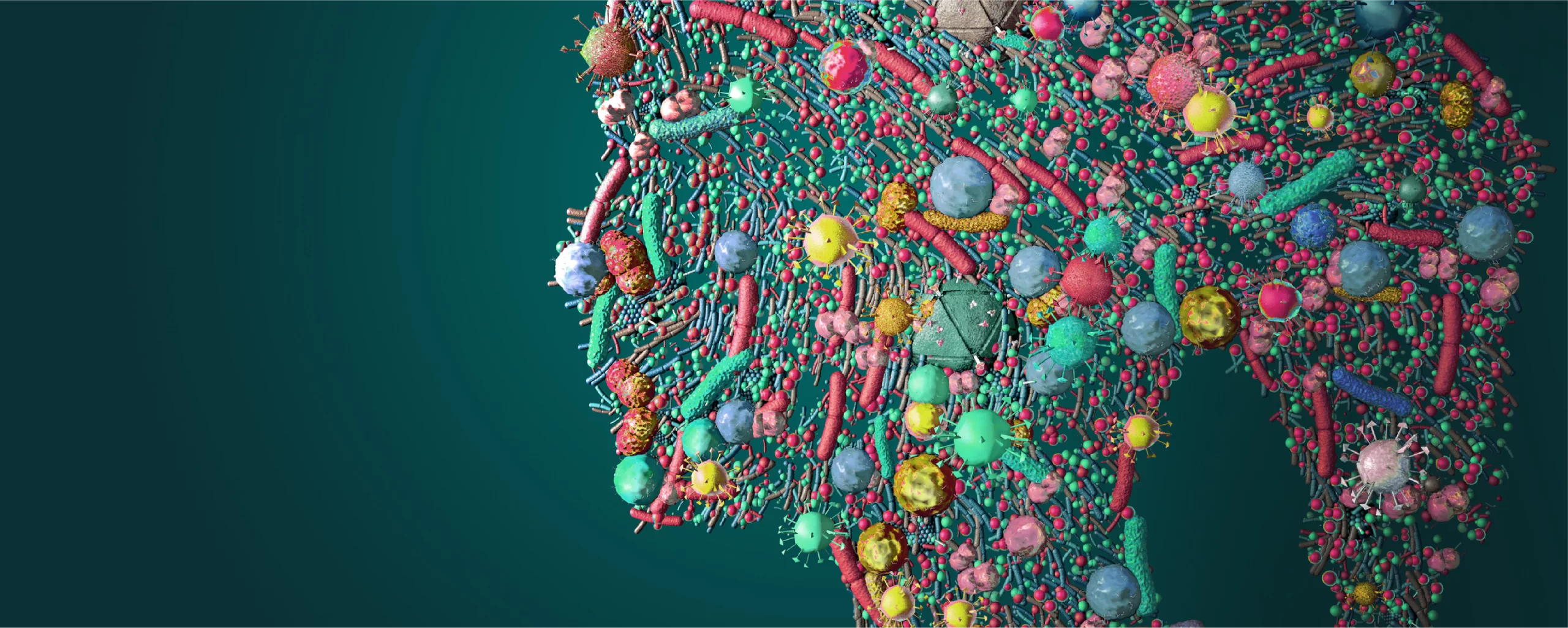DNA-Based Skincare Personalization- Cosmetogenomics
Cosmetogenomics is a unique scientific approach to interpreting the genetic profile for developing hyper-personalized cosmetic products suited for specific individuals. This term indicates a deeply rooted connection between genomics and how our skin responds to extrinsic stimuli and cosmetic products. The factors that are normally studied using cosmetogenomics can include premature aging, pigmentation, dryness, and inflammation. They can be monitored with absolute clarity using this approach. It can help develop personalized products, reducing the trial-and-error scenarios.
Our inherent genomics regulates the aging, healing, and interaction of our skin with different treatments, the concept of cosmetogenomics being based on this factor. Scientists take our DNA samples to effectively develop appropriate cosmetic products and look for the genetic factors directly influencing our skin health. The skin health factors could include the genes responsible for collagen synthesis in the skin, the elasticity of the skin, antioxidant levels, and the ability of our body to repair damaged skin cells resulting from exposure to harmful UV radiation or environmental pollution.
The following are some examples by which cosmetogenomics can aid its consumers in providing hyper-personalized cosmetic products:
- Collagen Degradation: By following the approach of cosmetogenomics, genetic factors determining the rate of collagen degradation can be identified. Based on the data gathered through testing procedures, suitable skincare treatments can be developed to target specific genetic sequences and prevent collagen degradation over time.
- Oxidative Stress: Our genes can indicate our skin’s capacity to prevent the aging effects of free radicals. Cosmetogenomics can determine whether individuals need skincare treatments for aging.
- Skin Inflammation: Our genes can also dictate the effect exerted by certain external stimuli and substances in cosmetic products on the skin. Certain skin-soothing products can be produced using cosmetogenomics.
Advantages
- Targeted Skincare: Skincare developed using this approach can be precisely effective for specific skin conditions, as opposed to generalized skincare products, which are not effective for every individual
- Prolong Benefits: Products targeting genetic factors to cure skin conditions can prove to be effective on a long-term basis
- Safety: This approach avoids certain ingredients that could be harmful to the skin by raising awareness about them
- Anti-aging Products Made Innovative: Products formulated using this approach tend to target the exact biological causes behind aging. Hence, they can prevent aging symptoms differently than conventional products.
Limitations

- High Cost of the Products: Due to the hyper-personalization of the products and production in small quantities
- Complexity: This approach involves DNA testing, and companies most often provide consumer personal testing kits. Many consumers find such complex procedures difficult to understand.
- Potential Misuse of Genetic Information: This is mostly preventable, but there is a mere possibility of occurrence since it involves collecting and analyzing personal genetic information. This data is mainly stored on computer systems, and hackers might be able to access this sensitive information, which could lead to identity theft.
Why DNA-based Personalization?
The following are some examples representing reasons behind the requirement of personalizing cosmetic products based on our genetic factors:
- Due to the differences in differentiation status and tissue context, the expression of DNA differs in every cell, despite them having the same genetic material in the nuclear DNA initially. However, the genetic activity of these genes does not remain consistent throughout the lifetime. As age progresses, along with environmental factors, their activity is altered. The synthesis of some surface proteins changes, which also modifies the properties of skin because of either inactivation or overactivation of some genetic factors. Hence, over time, skin tends to lose its optimal appearance. Out of some 4400 genes, only a few hundred are expressed by both old and young people. The gene response speed also tends to decrease with age. The expression of some proteins may increase or decrease as age progresses. Hence, each individual requires specific cosmetic products for anti-aging or other skin-related benefits.
- Genetic expressions can differ in intrinsically aged and photo-aged skin types. In intrinsic aging, the expression of collagen-producing genes decreases, while in photoaging, the genes that express the production of elastic tissues in the skin can increase.
- Cultural ethnicities and backgrounds highly influence various parameters related to skin appearance. For example, Caucasian skin is recognized by reduced melanin, smaller melanosomes, a thin stratum corneum and dermis, and a decreased TEWL. All of these factors point toward an increased risk of skin damage by light. On the contrary, Asian and African skin phenotypes have comparatively bigger melanosomes, increased melanin, and a thicker stratum corneum, indicating their resistance to photodamage. However, they may be more vulnerable to aging symptoms and skin dehydration.
- These phenotypic variations and challenges in establishing the definition of specific genome-drug interactions can also be implemented in dermatology.
- All of these factors indicate the need for personalized products based on specific genetic phenotypes of different individuals. Their skincare needs can depend upon their age, ethnicity, gender, extent of exposure to light, etc.
Key Players
1) Anake
- Anake is the first end-to-end DNA-based personalized skincare product supplier, and they’re known to utilize recent derma-genetics solutions and technology
- They recommend appropriate skin care solutions and related lifestyle changes based on the DNA analysis of their consumers
- 15+ genetic markers are tested through their DNA testing kit, which is provided directly to the consumers
- After the DNA testing, the company uses advanced skin detection equipment to analyze the skin profile visually. The equipment employs RGB visible light, polarized light, and UV spectrum imaging technology, along with AI and image analysis, to perform its functions. This equipment can shoot, analyze, and display the required results, providing 3-in-1 functionality
- This is followed by a consultancy session with company experts who formulate an appropriate skincare routine and recommend it to the customers. Based on the gathered data and reports, a customized skincare plan has been established
2) EpigenCare
- The company’s DNA testing kit “Skintelli” can produce epigenetic profiles of its customers and accordingly recommend personalized skincare products
- The DNA testing mechanism is based on validating 26 epigenetic markers associated with 8 key skin functions: Aging, Firmness and Elasticity, Moisture retention, Sun protection, Skin rejuvenation, Sensitivity response, Anti-Oxidation, and Pigmentation. The test correlates the functionality of skincare ingredients to the current skin quality.
- The DNA test is available in 3 forms: Basic – it is free of cost along with the function of providing an instant general set of questions and insights related to the skin, Standard – laboratory tests costing $99 which take 2-4 weeks along with product recommendations, and Advanced: lab tests costing $399, takes 6-18 weeks with product recommendations.
- The company also possesses an AI matching algorithm that contains an index of ingredients of 20,000+ skincare products and their effects on the epigenetic aspects of the markers. This algorithm functions by auto-inserting the product in the profile’s test report.
- The company also plans to develop a photo-based machine learning platform that would combine epigenetic testing with photo imaging, along with a lifestyle questionnaire and product review scraping
3) Genetic Beauty
- The company functions by checking 107 SNPs or snips, which provide data on which ingredients can make the consumers look more youthful
- The test, along with its report, costs around $99. The skincare recommendations are affordable for consumers. Serums can cost around $74, moisturizer at $67, and cleanser at $37.
4) Pure Culture Beauty
- With their belief that around 75% of consumers tend to choose the wrong skincare formulas, they offer properly customized skin care products based on the genetic profile of customers
- The customers can get self-tested and can send the results to the company by paying $79
- Clean, plant-based ingredients constitute the personalized formulas to target specific skin concerns
5) Caligenix
- The company claims to know biomarker rules and implications based on their studies regarding the million data points of DNA and RNA. The company uses this knowledge to generate personalized skincare recommendations with unique functionality. They call this breakthrough “Diagnostic Biology”.
- Their DNA+RNA biomarker test, along with robotics and AI functions, can provide personalized recommendations for both skincare and nutraceutical supplements
- DermatypeTM is a company business model powered by artificial intelligence and genomic analysis
- This involves external facial analysis through an AI engine, determining more than 15 crucial skin health and beauty benchmarks
- After the external analysis, a DNA test is conducted for the internal analysis. The test involves the analysis of core and various secondary genetic markers. A lifestyle questionnaire, along with a saliva swab, is conducted to gather the data.
- The company examines 5 key categories of skin aging through their proprietary combination of genetic markers: Firmness and Elasticity, Glycation, Free radical damage, Sun damage + pigmentation, and Sensitivity + inflammation.
- Personalized products are produced using data gathered based on AI, genomic analysis, and proprietary stem cell technology
6) Imagene Labs
- The company offers its enterprise-grade and cloud-based genetic analysis platform to various healthcare services and wellness brands. The companies can use their platform to develop personalized skincare products based on their customers’ genetic profiles.
- DNA result accuracy is enhanced through the company’s ancestry and patented genetic risk analytics system. Combining machine learning involves comparing the user’s genetic data with the most ethnically relevant genetic dataset references.
- The company’s software platform complies with Singapore’s Personal Data Protection Act (PDPA)
Status in Market
- In 2024, the global market size for DNA-based skincare products was valued at USD 7.61 billion, which is expected to grow at a CAGR of 6.8% from 2025 to 2030. This growth results from the increasing incidence of skin problems like acne and atopic dermatitis, and the growing consumer interest in personalized skincare solutions. Also, there have been many new technological innovations in genomics and biotechnology, which have enabled the development of many accessible and efficient products.
- Due to heightened consumer awareness, consumers are more prone to spending on such products, further driving the growth of this market. Such trends can be widely observed in millennials and Gen Z consumers, along with their willingness to invest in premium personalized products, which are making DNA-based skincare products popular in the market.
- DNA testing is also becoming affordable, leading to a rise in home DNA test kits. These kits tend to give insights into individual skin health, aiding companies in offering specifically tailored products and services for consumers.
Insights on Product Trends
- Cream products have been dominating this market, with a revenue share of 52.1% in 2024, owing to their versatile functional properties regarding skin health
- From 2025 to 2030, the serum sector is expected to grow at the highest CAGR because of the increasing awareness and popularity of personalized skincare products. Innovative serum formulations containing an increased concentration of active ingredients are also becoming popular.
Insights on Distribution Channels
- The offline segment has contributed the highest revenue share to the market because consumers are confident in physically assessing the product and in face-to-face consultations. The benefits of usage and the personalized features are explained in detail, and the consumer can more efficiently review the packaging and list of ingredients.
- However, due to the increasing consumer convenience and approachability trend, the online segment is expected to grow at the highest rate from 2025 to 2030
Region-specific Insights
- The North American DNA-based skin care products have contributed the highest revenue share in the market at about 38.4% in 2024
- The Asia Pacific DNA-based skin care products are expected to grow at the highest CAGR from 2025 to 2030 due to the increasing demand for personalized skincare products
- European DNA-based skin care products can also grow at a significant rate during the upcoming tenure
Conclusion
In today’s age, everything is digitalized, and artificial intelligence has dominated all the technological spheres of life. These interventions are good for our future, but at the same time, they make the system prone to risks and threats like identity theft, cybercrimes, information misuse, etc. Combating skin problems and maintaining healthy skin has become more precise and effective using DNA-based skincare personalization. Each skin type is catered to according to its specifications. Utilization of genetic sequencing of people to create skincare products involves collecting their genetic information from databases and then providing the solutions according to need. The future for this field looks very promising and positive, given its various advantages. Still, enhanced inclusivity can make it grow at an even higher rate than it presently is.
Let's Take the Conversation Forward
Reach out to Stellarix experts for tailored solutions to streamline your operations and achieve
measurable business excellence.



